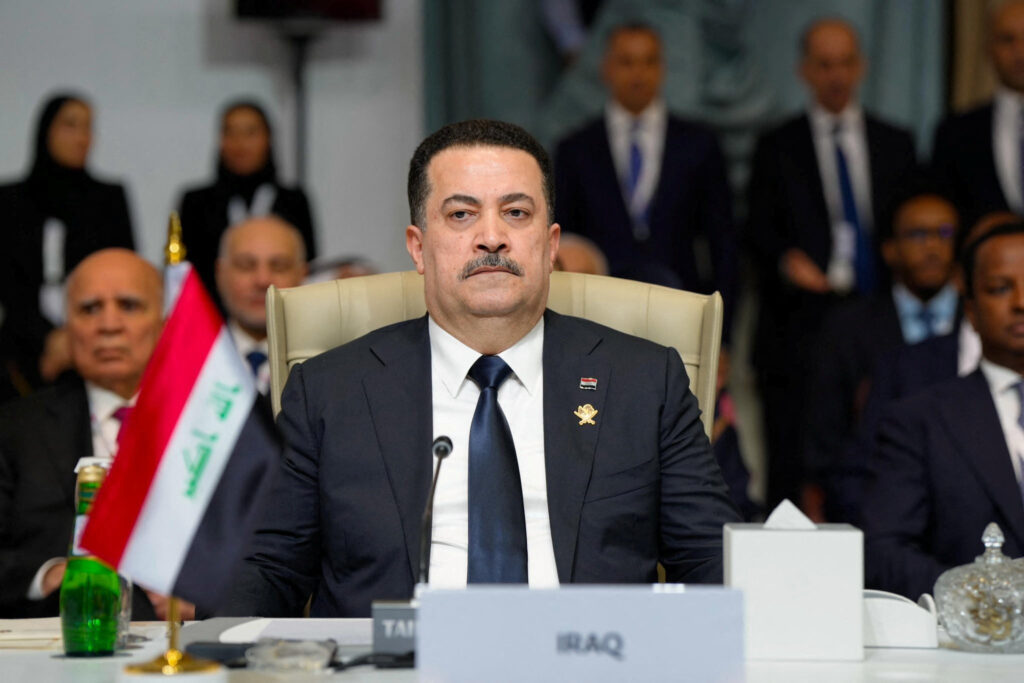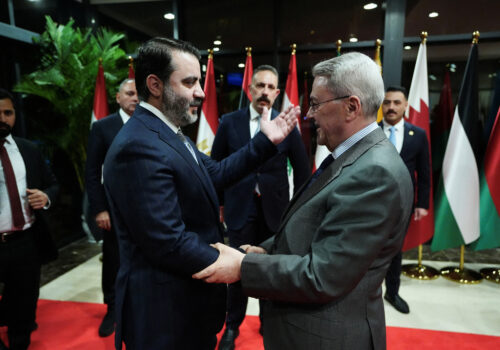The Khor Abdullah waterway has re-emerged as a point of tension between Iraq and Kuwait. After being presumed a settled matter, the waterway is now at the center of a heated sovereignty dispute after Iraq’s Federal Supreme Court annulled a 2012 bilateral treaty with Kuwait. This comes at a time when Iraq is attempting to rebuild and strengthen its ties with its Gulf neighbors, and as it looks to develop an economy less focused on natural resources in favor of one that emphasizes international trade.
This dispute has a long history that stems from opposing sovereignty claims and competing geopolitical and economic interests, drawing in regional actors like the Gulf Cooperation Council (GCC) and international observers concerned about the precedent such disputes could set. The controversy reflects a wider struggle inside Iraq itself—between those who view the agreement as a betrayal of sovereignty, and those who want to preserve it.
The dispute also affects regional development, particularly Iraq’s Grand Faw Port and Development Road Project, which aims to position Iraq as a logistics hub connecting the Gulf to Europe. Kuwait’s Mubarak Al Kabeer Port, part of its 2035 Vision and China’s Belt and Road Initiative, is seen by Iraqis as restricting maritime access and threatening the viability of its projects, while Kuwaiti officials maintain it complements rather than undermines regional trade connectivity.
The Khor Abdullah waterway dispute underscores the complexities of post-conflict border demarcation and treaties and how technical legal disputes may multiply into geopolitical issues.
Given the complexities at hand and the highly charged and politicized nature of the dispute from a domestic perspective, especially for Iraq, it may be difficult to resolve this dispute on a bilateral basis. This is where international legal bodies may serve as impartial arbiters.
SIGN UP FOR THIS WEEK IN THE MIDEAST NEWSLETTER
Iraq’s Supreme Court decision and internal divisions
Importantly, the Iraqi Federal Supreme Court’s 2023 ruling that invalidated the bilateral treaty was not based on the substance of the treaty, but purely on procedural grounds. The Court stressed that the annulment was due to procedural violations, and its ruling stated that such violations rendered the treaty invalid from the outset, meaning Iraq is not bound by it under international law.
The ruling determined that the ratification of this agreement violated Article 61(4) of the Iraqi Constitution, which requires a two-thirds majority of parliament to approve international treaties. At the time the agreement was ratified, a 1979 law governing the ratification of international treaties and agreements was in effect. This law, however, did not include the constitutional requirement that international treaties be ratified by a two-thirds majority. Because the Constitution is supreme to simple laws and implicitly amends any existing laws that contravene its articles, the Supreme Court found that the Khor Abdullah ratification law, which was passed by a simple majority, was constitutionally invalid. Under international law, this ruling finds support in Article 46 of the Vienna Convention on the Law of Treaties (1969), which allows a state to invalidate consent to a treaty if that consent resulted from a manifest violation of its internal law regarding treaty-making authority.
However, several factors raised questions about the ruling, regardless of its legal soundness. For example, the Supreme Court has issued a number of controversial decisions in recent years, being perceived as politically motivated, with little deference to political actors. In fact, the vast scope of controversies led to a crisis that recently resulted in a change of leadership in the court. The timing of the decision also raised questions, following the dismissal by the same court of a similar case in 2014 to annul the treaty.
The court also included in its decision a historical review of the region and claims on sovereignty, which were unnecessary to resolve what it claimed was a procedural question of Iraqi law. Portions of the Iraqi government view the 2012 bilateral agreement with Kuwait as a compromise of its sovereignty, believing it grants Kuwait control over a significant portion of Iraq’s maritime access. Conversely, Kuwait considers the agreement a legitimate and binding international treaty, and Iraq is obligated to abide by it. While the politics and timing of the Supreme Court’s decision drew controversy across the Gulf, Iraqis who support the court’s decision view it as an assertion of constitutional procedure, while critics argue that it complicates Iraq’s regional cooperation.
The aftermath
Domestically, the dispute has sparked intense political mobilization. Prime Minister Mohammed Shia Al-Sudani and President Abdullatif Rashid filed requests for reconsideration seeking to overturn the Federal Supreme Court’s ruling. Chief Justice Faiq Zaidan argued that the annulment poses significant legal and diplomatic consequences. Following rounds of internal discussion, al-Sudani has requested that parliament re-ratify the treaty, signaling a desire to maintain it for diplomatic reasons. On the other hand, nearly two hundred members of parliament signed a petition demanding the formal revocation of the 2012 maritime agreement, characterizing it as a “humiliating concession” that compromised national sovereignty, resulting from an exploitation of Iraq’s weak international standing following the 1991 Gulf War.
Kuwait has maintained that the 2012 agreement with Iraq is a valid and binding international treaty. This agreement was registered with the United Nations (UN) in accordance with Article 102 of the UN Charter. Kuwait asserts that the agreement was a culmination of efforts to normalize relations post the 1991 Gulf War and was built upon UN Security Council Resolution 833, which demarcated the land border between the two nations.
Kuwaiti officials have also argued that Iraq’s subsequent objections are politically motivated and legally groundless, accusing Baghdad of attempting to rewrite history decades after the fact. Kuwait’s Prime Minister Sheikh Ahmad Nawaf al-Sabah stated that the Iraqi Federal Supreme Court’s ruling contained “historical fallacies.”
Legal principles and maritime law that apply
The legal foundation of the Khor Abdullah dispute rests on a combination of bilateral and international treaties and conventions, and international maritime law.
Under the Vienna Convention on the Law of Treaties (1969), Article 26 requires states to observe validly concluded treaties (pacta sunt servanda). Kuwait relies on this provision, emphasizing that the 2012 agreement was registered with the UN under Article 102 of the UN Charter. However, Article 46 of the Vienna Convention allows a state to claim that its consent was invalid in the case of a manifest violation of its internal law.
The dispute also engages the United Nations Convention on the Law of the Sea (UNCLOS). Articles 15, 74, and 83 govern maritime delimitation and equitable access, while Articles 17-19 ensure the right of innocent passage. Part XV (Article 287) provides for dispute settlement through the International Tribunal for the Law of the Sea (ITLOS), the International Court of Justice (ICJ), or arbitration. Additional legal bases include UN Security Council Resolution 833 (1993), which demarcated the Iraqi-Kuwait land boundary, and the Charter of Economic Rights and Duties of States (UNGA Resolution 3281, 1974, Article 9), which prohibits activities causing economic harm in shared spaces. Collectively, these instruments define the legal parameters of the dispute.
The way forward
If the Iraqi parliament refuses to ratify the agreement, a durable and viable resolution must be found. One that rests on reengagement, and which is grounded in equity, mutual economic interest, and respect for both international and constitutional law.
If Iraq and Kuwait decide to resolve their dispute through the ICJ, the Maritime Delimitation and Territorial Questions between Qatar and Bahrain provide a highly relevant precedent for the peaceful resolution of maritime disputes in the Gulf region. As the only ICJ maritime boundary case between Arab states, it shows that longstanding Gulf disputes can be resolved through international adjudication. ITLOS may also be an appropriate forum for a resolution, given its specialized jurisdiction and expertise in maritime boundary and navigation disputes.
Ultimately, the Khor Abdullah dispute is more than a technical quarrel over maritime boundaries. By choosing dialogue and legal adjudication, Iraq and Kuwait can transform a contentious dispute into a symbol of regional diplomacy and legal order, while also showing deference and respect to international law and international legal bodies.
Rami Alkhafaji is a legal and public policy researcher with a focus on international law, global economic governance, international trade, and foreign policy.
Safwan Al-Amin is an international attorney and public policy advisor who counsels corporations and governments on legislative and regulatory matters. He publishes regularly on legal and constitutional matters related to Iraq.
Further reading
Tue, Sep 30, 2025
Is the Baghdad-Erbil oil deal a blueprint for settlement—or a stopgap?
MENASource By Victoria J. Taylor , Yerevan Saeed
Whether the oil deal will be a tactical stopgap or a step towards permanent settlement will become known after the Iraq's elections and the year's end.
Wed, Sep 10, 2025
Ten questions (and expert answers) on Operation Inherent Resolve’s end in Iraq
MENASource By
This new frontier in the US-Iraq relationship leaves many opportunities, challenges and unknowns. Our experts unpack it all.
Wed, Jun 4, 2025
Why Iraq should build bridges with its ‘new’ neighbor, Syria
MENASource By
Iraq's position on the Syria transition is split between two camps: the official government, and that of the powerful non-state actors.
Image: Iraqi Prime Minister Mohammed Shia al-Sudani attends the emergency Arab-Islamic leaders' summit in Doha, Qatar, September 15, 2025. Iraqi Prime Minister's Media Office/Handout via REUTERS ATTENTION EDITORS – THIS IMAGE WAS PROVIDED BY A THIRD PARTY.




